Premium Only Content
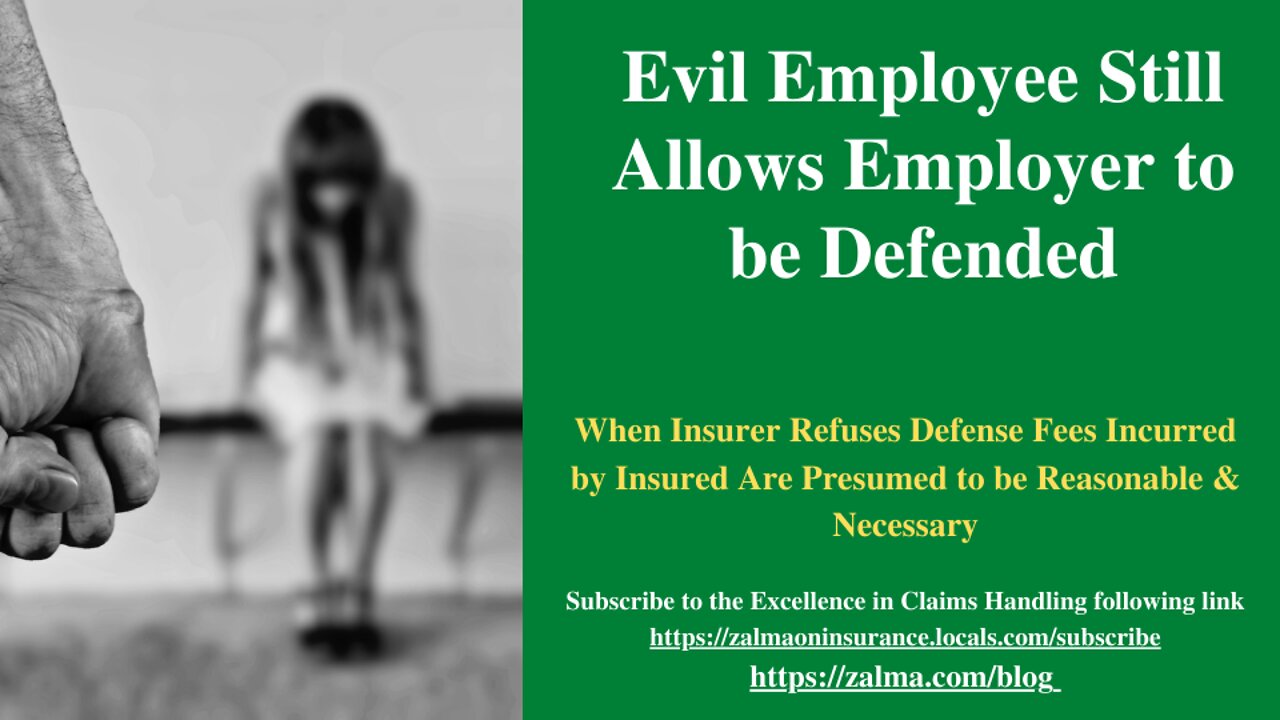
Evil Employee Still Allows Employer to be Defended
When Insurer Refuses Defense Fees Incurred by Insured Are Presumed to be Reasonable & Necessary
Insurer Should Consider Defense Under a Reservation Rather than Refuse Defense
Larry Nassar, who was affiliated with nonprofit USA Gymnastics, Inc. (“USAG”), sexually assaulted hundreds of female athletes. After Nassar’s conduct came to light, USAG faced many lawsuits and multiple investigations. USAG and its insurers, including Liberty Insurance Underwriters, Inc., litigated questions about insurance coverage in an adversary proceeding before a bankruptcy court. In a previous appeal, among other rulings, the Seventh Circuit affirmed the decision that Liberty had a duty to defend USAG.In USA Gymnastics v. Liberty Insurance Underwriters, Inc., No. 21-2914, United States Court of Appeals, Seventh Circuit (August 16, 2022) USAG and Liberty disputed the amount of fees to which USAG was entitled after liability of Liberty to defend was established by the Seventh Circuit.Right to Reimbursement of Attorneys FeesThere were also ancillary disputes over the amount of attorneys’ fees that Liberty owed USAG.The underlying facts are described in detail in USA Gymnastics v. Liberty Ins. Underwriters, Inc., 27 F.4th 499, 508 (7th Cir. 2022). In short, Nassar used his position with USAG to sexually assault hundreds of women and girls over several decades. Because of that abuse, USAG has faced hundreds of lawsuits by former athletes, as well as several investigations by federal and state entities, including Congress, the Indiana Attorney General, and the United States Olympic &Paralympic Committee (“USOPC”).Faced with cross-motions for summary judgment, the bankruptcy court concluded that Liberty’s policy covered the “athlete lawsuits” and various investigations. Liberty filed objections to the bankruptcy court’s findings and conclusions, but the district court overruled those objections. In January 2020, the district court ordered Liberty to “provide a complete defense” to USAG with respect to several matters, including the athlete lawsuits and several investigations. The district court also ordered Liberty to reimburse USAG for its defense costs, but the court did not award damages in any specific amount. Liberty appealed the district court’s order.While the first appeal was pending, the parties continued to dispute and litigate issues concerning payment. Liberty did not agree to USAG’s demand and sought to stay the district court’s defense order. In turn, USAG moved to enforce the order.In addition, USAG offered the expert testimony of attorney Gene Schoon, who had prior experience serving as a national coordinating counsel during his days as a practicing lawyer. He testified that in his opinion, all the fees USAG sought were reasonable and necessary. On the other hand, Liberty presented the expert testimony of attorney Brand Cooper. At that point, Cooper testified that he determined certain fee amounts incurred by USAG-which totaled about $1.43 million-were reasonable and necessary. Yet almost immediately, Cooper contradicted his prior testimony. In answer to the court’s questions, Cooper expanded on the nature of his objections but refused to give concrete figures that were not disputed.It is undisputed that USAG paid nearly 70 percent of the attorneys’ fees for which it now seeks reimbursement. That is compelling evidence of a market test. This element of the Thomson presumption supports, rather than contradicts, the bankruptcy and district courts’ conclusions that the fees USAG claimed are presumed to be reasonable and necessary.Incorrectly Refusing to Defend Eliminates the Insurer’s Right to Control Defense CostsTherefore, the judgment was affirmed.
ZALMA OPINION
Insurers take the risk of paying more for the defense of an insured when it refuses to defend and is later found to have erred and a court orders the insurer to defend or indemnify the insured. In such situation a presumption exists that an insured, using its own money to pay counsel paid only reasonable and necessary fees. As the Seventh Circuit concluded the insured – in bankruptcy – did not have money available to pay excessive fees and presumed what they paid and what they were unable to pay were reasonable and necessary and Liberty must reimburse USAG for those fees. If Liberty defended under a reservation of rights it could control the fees and if it was found to have no coverage it could get reimbursement from the insured from whatever assets available from the bankruptcy court. Liberty gambled it was right and lost and must pay the fees charged to USAG.(c) 2022 Barry Zalma & ClaimSchool, Inc.
Barry Zalma, Esq., CFE, is available at http://www.zalma.com and zalma@zalma.com.
Subscribe and receive videos limited to subscribers of Excellence in Claims Handling at locals.com https://zalmaoninsurance.locals.com/subscribe.
Write to Mr. Zalma at zalma@zalma.com; Go to the Insurance Claims Library – https://zalma.com/blog/insurance-claims-library/
-
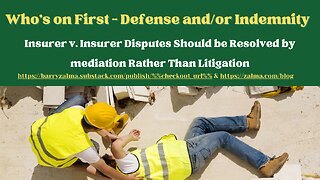 10:17
10:17
Barry Zalma, Inc. on Insurance Law
11 months agoWho's on First - Defense and/or Indemnity
178 -
 53:15
53:15
Kimberly Guilfoyle
2 hours agoCalifornia Residents Demand Answers, Live with Rep Vince Fong, Mike Davis, and Paul Peterson | Ep. 188
7.38K10 -
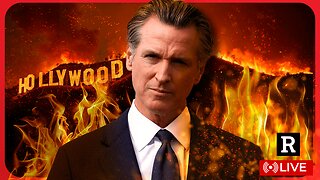 LIVE
LIVE
Redacted News
1 hour agoEMERGENCY! 10 MILLION UNDER FIRE WARNING & 100 MPH WINDS, NEWSOM UNVEILS CALIFORNIA 2.0 PLAN
14,554 watching -
 49:33
49:33
Candace Show Podcast
1 hour agoI Respond To Mr. And Mr. Macron | Candace Ep 131
16.9K18 -
 LIVE
LIVE
Revenge of the Cis
2 hours agoEpisode 1429: Catch And Release
2,109 watching -
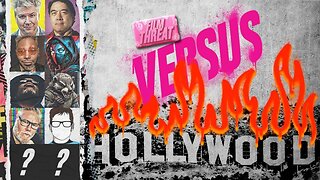 LIVE
LIVE
Film Threat
7 hours agoVERSUS: HOLLYWOOD IS STILL ON FIRE | Film Threat Versus
179 watching -
 12:33
12:33
Silver Dragons
1 hour agoSilver Price Crushed Today - NEW TREND STARTING?
2.27K -
 1:02:03
1:02:03
In The Litter Box w/ Jewels & Catturd
20 hours agoRecall Newscum & Bass! | In the Litter Box w/ Jewels & Catturd – Ep. 718 – 1/13/2025
38.7K16 -
 3:19:58
3:19:58
Tate Speech by Andrew Tate
8 hours agoEMERGENCY MEETING EPISODE 101 - STRENGTH AND HONOR
129K53 -
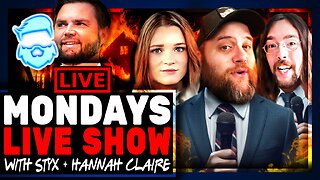 1:48:09
1:48:09
The Quartering
5 hours agoLA Fires Are About To Get Way Worse, Trump Vs Vance On J6 Pardons, Brett Cooper Bombshell & More
83.1K33